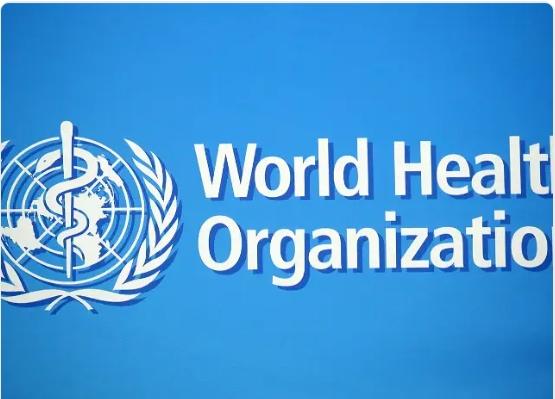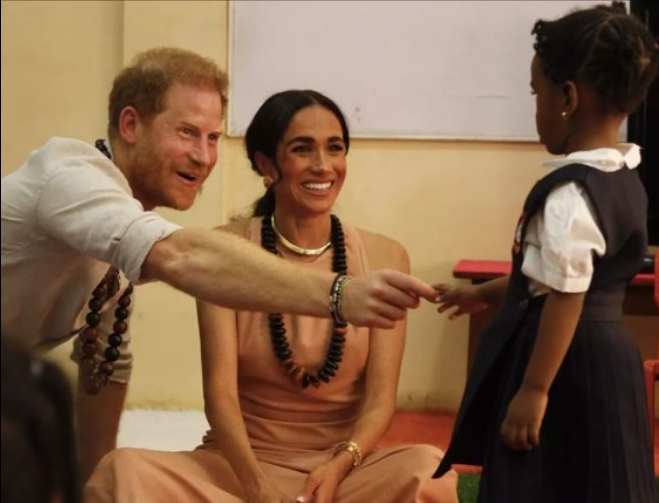Headline
WHO Releases 5 Themes For Improved Mental Health
Published
7 months agoon
By
Editor
The World Health Organisation (WHO) has released a new report entitled: “Mental health of refugees, migrants, risk, protective factors and access to care”.
The organisation in a statement on Tuesday outlined the latest global evidence on main factors influencing the mental health of refugees and migrants and their access to care.
It said that it was the fifth report of the Global Evidence review on Health and Migration (GEHM).
“Around one in eight people globally live with a mental health condition.
” Refugees and migrants are particularly vulnerable, as they can be exposed to various stress factors and challenges, which affect their mental health and well-being both during their journeys and on arrival.
“The prevalence of common mental disorders such as depression, anxiety and Post-traumatic Stress Disorder (PTSD) tends to be higher among migrants and refugees than among host populations.
READ ALSO: Divestment: CSOs Want FG To Prohibit Oil Companies Sales Of Assets In Niger Delta Until…
“Girls and women on the move have a higher risk of depression and anxiety,” it said.
Dr Santino Severoni, Director of the WHO’s Department of Health and Migration, said good mental health and well-being is a right for all, including for refugees and migrants.
Severoni said that the report would support and strengthen health systems’ responses to the mental health needs of refugees and migrants<
He said the report would enable them receive quality mental health care and support in ways they find accessible, acceptable and affordable.
The report summarised different risk factors and barriers refugee and migrant groups experience, and outlines five key themes to be addressed in order to improve their access to mental health care.
READ ALSO: 15-year-old Girl ‘Gang-r*ped, Murdered, Dumped In 50ft-deep Well’
“Community support: Evidence shows that being part of a community with a shared background and attending school are associated with lower rates of mental disorders.
“Basic needs and security. For example, an insecure legal status can contribute to poor mental health.
“Stigma: experiences of racism and discrimination are consistently associated with adverse mental health outcomes.
“Adversity and trauma. For example, extended detention is associated with increased rates of depression and PTSD.
“Access to services. Refugees and migrants often do not prioritise their mental health because they are not aware of the services available free of charge or do not accept health care due to language barriers and concerns around confidentiality.
“Refugees and migrants face many unique stressors and challenges,” it said.
READ ALSO: Petrol Tanker Falls, Spills Content In Lagos
Mrs Dévora Kestel, WHO Director for Mental Health and Substance Use, said that the report sets out the urgent need for robust policies and legislation, rooted within stronger health systems to meet the mental health care needs of refugees and migrants.
She said that urgent actions are needed by policymakers based on the findings of the review.
“GEHM puts forward a series of actions for consideration by governments, policymakers, and programme managers in Ministries of Health and other ministries, cutting across all the five thematic areas outlined:
“Promote refugees’ and migrants’ participation in society and reduce discrimination by adopting refugee- and migrant-sensitive mental health policies.
“Address the non-medical factors that impact mental health in migration policies and prioritize basic needs, such as food, housing, safety, and education or employment.
“This means, for example, using settings other than detention facilities to assess the health status of refugees and migrants,” it said.
The statement said that health workers would be trained to assess and treat mental health conditions among refugees and migrants and strengthen the capacity of other relevant professionals.
It said that the trained workers would also recognise and support those with mental health conditions.
You may like
Headline
B-I-Z-A-R-R-E! Man Missing For 26 Years Found Alive In Neighbour’s House
Published
18 hours agoon
May 17, 2024By
Editor
An Algerian man, Omar Bin Omran, who went missing at the age of 17, 26 years ago following an alleged kidnapping, has been found alive in his neighbour’s house.
According to Daily Mail on Wednesday, Omar was discovered in a hole in the ground within a sheep pen, concealed under stacks of hay.
Omar, one of nine children, disappeared in the city of Djelfa, Algeria, 26 years ago. His family believed he had been killed during the civil war that ravaged the nation in the 1990s and early 2000s.
According to reports, Omar was found less than 200 meters from his family’s home. A 61-year-old neighbour is now in police custody after Omar, now 45, was rescued on May 12.
Footage was shared on social media and broadcast on Algerian television networks of the moment that he was found in what appeared to be a hole in the ground, described by authorities as a sheep pen, within the home of his alleged captor.
READ ALSO: JUST IN: Convicted Kidnap Kingpin Evans Re-arraigned, Opts For Plea Bargain
The blurry video shows torchlights shining into a pit surrounded by hay as Omar furtively looks up, seemingly in shock at the search party surrounding him, with stray pieces of straw in his hair.
Other images have since been circulated of the bearded man emerging from the hole, thought to be a sheep pen, and of him as a teenager, sitting with a dog and with young children before he disappeared.
According to the Algerian newspaper El Khabar, his dog recognized his scent and stayed near where Omar was held. It was alleged that the captor poisoned the dog to ward the family off.
Omar went missing in 1998 while heading to a vocational school. He was found after the captor’s brother aired grievances on social media, reportedly over an inheritance dispute.
This led Omar’s family to search the neighbour’s house, where they found him. The captor attempted to flee but was restrained and arrested.
Tragically, Omar’s mother died in 2013 without knowing the fate of her son. Reports suggest Omar was informed of his mother’s death while in captivity.
A relative said on Facebook: ‘Thank god my cousin was found. Bin Imran Omar is in good health after 26 years of disappearance. Awaiting details of the case and investigations.’
Public prosecutors in Djelfa, a mountain city of around 500,000 people around 140 miles south of coastal capital Algiers, say Omar will receive psychological care after being rescued as they vowed to get him justice.
‘The Djelfa Attorney General’s Office informs the public that on May 12 at 8 pm local time, it found victim Omar B, aged 45, in the case of his neighbour, B.A., aged 61,’ they said in a statement.
A court official in Djelfa was quoted as saying: “Two days ago, on 12 May 2024, the Public Prosecutor’s Office received, through the regional department of the National Gendarmerie in El Jadid, a complaint against an anonymous person claiming that the complainant’s brother, Omar bin Omran, who has been missing for about 30 years, is in the house of one of his neighbours, inside a sheepfold.”
Following this report, the General Prosecutor of the Court of Idrisiya in the province of Djelfa ordered the National Gendarmerie to open an in-depth investigation and officers went to the house in question.
READ ALSO: [FULL LIST] BET Awards 2024: Burna Boy, Asake, Others Bag Nominations As Drake, Nicki Minaj Lead
He added: “The Public Prosecutor’s Office ordered that the victim receive medical and psychological treatment, and the suspect will be presented to the Public Prosecutor’s Office immediately after the completion of the investigation.”
Officials have promised the ‘perpetrator of this heinous crime’ will be tried with ‘severity.’
The suspect, a civil servant, lived alone but was often seen buying enough food for two people. A neighbour recounted to Algerian TV station Bilad that Omar’s mother died without knowing her son was so close by.
Questions have arisen about why Omar did not call for help during his captivity. Some reports claim Omar said he was unable to call out because of a spell cast by his captor, while others suggest his psychological state may have prevented him from seeking help.
The case may be among the world’s longest-running kidnapping cases. Eleven-year-old Jaycee Dugard was kidnapped in Meyers, California in 1991 and remained missing for over 18 years after she was captured by Phillip and Nancy Garrido.
Dugard was kept in depraved conditions and was subjected to extreme sexual abuse, having two children by Phillip Garrido, and later said she adapted to sympathising with her captors to survive.

The Federation Allocation Allocation Committee has disclosed that during the May 2024 meeting of the FAAC held in Abuja, N1.2tn from the April 2024 Federation Account Revenue was shared by the federal, states, and local governments.
The Director of Press and Public Relations, Office of the Accountant-General of the Federation, Mr Bawa Mokwa, disclosed this in a statement on Thursday.
The document revealed that N1.2tn total distributable revenue comprised distributable statutory revenue of N284.71bn, distributable Value Added Tax revenue of N466.45bn, Electronic Money Transfer Levy revenue of N18.02bn, and Exchange Difference Revenue of N438.88bn.
Total revenue of N2.19tn was available in April 2024.
READ ALSO: FAAC: FG, States, LGs Share N1.15trn For January
The total deduction for the cost of collection was N80.51bn; the total transfers, interventions, and refunds were N903.47bn.
Gross statutory revenue of N1.23tn was received for April 2024.
This was higher than the sum of N1.01bn received in March 2024 by N216.28bn.
The gross revenue available from the value-added tax in April 2024 was N500.92bn. This was lower than the N549.69bn available in March 2024 by N48.77bn.
READ ALSO: FAAC Shares N786bn To FG, States, LGs
From the N1.2tn in total distributable revenue, the Federal Government received a total sum of N390.41bn, the state governments received N403.40bn, and the local government councils received N293.81bn.
A total sum of N120.450bn (13 per cent of mineral revenue) was shared with the benefiting states as derivation revenue.
On the N284.716bn distributable statutory revenue, the communiqué stated that the Federal Government received N112.14bn, the state governments received N56.88bn, and the local governments received N43.855bn. The sum of N71.83bn (13 per cent of mineral revenue) was shared with the benefiting states as derivation revenue.
The Federal Government received N69.96bn, the state governments received N233.22bn, and the local governments received N163.26bn from the N466.45bn distributable value-added tax revenue.
READ ALSO: FAAC Shares N1.100 Trillion To FG , States, LGs
A total sum of N2.704bn was received by the FG from the N18.024bn Electronic Money Transfer Levy. The state governments received N9.012bn, and the local governments received N6.30bn.
The Federal Government received N205.59bn from the N438.88bn Exchange Difference revenue. The state governments received N104.27bn, and the local governments received N80.39bn. The sum of N48.62bn (13 per cent of mineral revenue) was shared with the benefiting states as derivation revenue.
According to the communiqué, in April 2024, oil and gas royalties, company income tax, excise duty, petroleum profit tax, electronic money transfer levies, and CET levies increased significantly, while import duty and value-added tax recorded considerable decreases.
The FAAC noted that the balance in the Excess Crude Account remained at $473,754.57.
Headline
Harry & Meghan: Outrage As UK Journalist Says Nigerians Are Nazis
Published
20 hours agoon
May 16, 2024By
Editor
A British journalist, Christopher Wilson, sparked outrage among many Nigerians with a now-deleted tweet.
In the tweet, Wilson compared Nigerians to Nazis for welcoming the Duke and Duchess of Sussex, Prince Harry and Meghan Markle, to Nigeria, igniting widespread condemnation.
The three-day visit of Prince Harry and Meghan to Nigeria attracted significant attention and reactions worldwide.
“Desperate to show his wife they were still ‘royal’ in the eyes of the world, the Duke of Windsor took Wallis on a tour of Germany in 1937. Nigeria’s human rights record is not far short of Nazi Germany’s,” Wilson posted on Tuesday.
Wilson, author of ‘A Greater Love: Charles and Camilla,’ was referring to Wallis Simpson, an American socialite who became the wife of King Edward VIII.
READ ALSO: Step-by-step Guide To Accessing FG Consumer Credit Scheme
Edward VIII, Queen Elizabeth II’s uncle, abdicated the throne in 1936 to marry Simpson.
The monarch’s decision to marry Simpson, a divorcée, triggered a constitutional crisis, leading to Edward’s abdication from the throne in December 1936.
After their marriage, they became known as the Duke and Duchess of Windsor.
The couple travelled extensively, and notably, they visited Adolf Hitler at his Berghof retreat in Bavaria, Nazi Germany, in October 1937.
Markle, an American divorcee, married Prince Harry in 2018.
However, the couple announced their decision to step back from their royal duties in 2020 and relocated to California, United States. Despite their move, they retained their titles as the Duke and Duchess of Sussex.
READ ALSO: Nigerian Burnt To Death In Bangkok Car Crash
When confronted for comparing Nigeria to Nazi Germany, Wilson referenced a 2023 report from the United States Department of State Bureau of Democracy, Human Rights and Labour.
The report he cited highlights human rights abuses in Nigeria, including extrajudicial killings, torture, harsh prison conditions and arbitrary arrests, among others.
The post sparked criticism and backlash from Nigerians and netizens.
On X.com, @wukster2, who tweets anonymously, wrote, “How did we become Nazis @TheWislon? You are so triggered by Harry and Meghan that you have resorted to comparing Nigeria to Nazi Germany. Meghan Markle’s power over mediocre white men and women needs to be studied. We need a global conference.”
A tweep, Faith Harvest, who identifies as @harvest_fa77000 on X, wrote, “Desperate? Nah, there is no comparison. Try as they may to liken Meghan to Wallis Simpson, Meghan is no Wallis and Harry is certainly not an abdicated king with sympathies to Hitler, and as far as human rights records, Christopher Wilson needs to read up on his own history!”
On Arise TV’s The Morning Show, journalist, Rufai Oseni, also voiced his criticism.
READ ALSO: How Australian Doctor Treated Own Brain Cancer With Personal Research Studies
“These people are racist. This is the height of racism. He’s just so jealous because Harry and Megan came to Nigeria and they got relevance and it’s in your face it’s going to hurt you to the very end. I hope that this racism eats your bile up and it continues to eat you because we can’t continue this way. How would you relate them to what happened in Nazi Germany?
“The scenarios are different very different. These people came for a worthy cause in Nigeria which is the Invictus game, to be able to support veterans. Harry has built a brand with this Invictus game that goes around the world and has supported a lot of veterans and that’s something worth celebrating but because of the hatred and the bile that you have against this guy just let him be,” Oseni said.
Glow Lee, who tweets as @GlowanneLee, said, “Christopher Wilson is a royalist journalist critical of Meghan from the beginning and has just compared Nigeria to Nazi Germany. This is the mentality of the hard-core royalist. If they can say these things on Twitter, what would they say off it?”
The Duke and Duchess of Sussex arrived in the capital city of Abuja last Friday and were pictured at a range of engagements over the weekend.
The official purpose of the trip was to celebrate the Invictus Games, Harry’s tournament for wounded soldiers in Nigeria.

Makinde Set To Recruit 7,000 Teachers In Oyo

Why I Named University, College After My Mother – Oyinlola

Tears, As Jnr. Pope Is Laid To Rest In Enugu
Trending

 Headline4 days ago
Headline4 days agoLady Arrested For Allegedly Harassing, Cyberstalking Crown Prince Of Benin Kingdom [VIDEO]

 News4 days ago
News4 days agoEdo Govt Takes Custody Of 4-year-old Girl Used For Adult Content

 Entertainment3 days ago
Entertainment3 days agoVIDEO: Drama As Portable Jumps Gate To Evade Police Arrest

 Headline3 days ago
Headline3 days ago32-year-old Nigerian Doctor Killed In US, Father Mourns

 News3 days ago
News3 days agoMan Arrested For Invading Plateau Bank With Bomb

 News4 days ago
News4 days agoBREAKING: Organised Labour Shut BEDC Head Office

 News3 days ago
News3 days agoSee Lagos Environment Commissioner’s Funny Reply To Resident’s Complaint About Neighbours Moaning Loudly At Night

 Politics4 days ago
Politics4 days agoDefection: Edo Govt, Ex-PDP BoT Member, Idahosa In Verbal War

 Headline4 days ago
Headline4 days ago‘You’re Guilty’ – Judge Roars, Jailed UK-based Nigerian Pastor, Wife 34 Years For Raping, Assaulting Members

 News4 days ago
News4 days agoVIDEO: Lady Laments As Lagos Issues Demolition Notice Two Months After Property Purchase

























